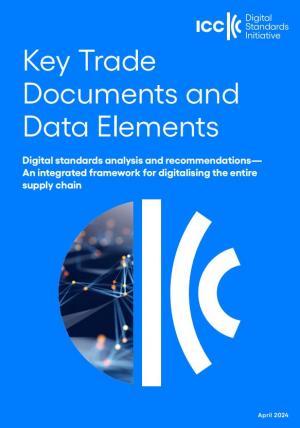Trade documents are the building blocks of global supply chains, articulating key terms of transactions or events occurring between two or more parties.
The publication today of the Key Trade Documents and Data Elements (KTDDE) report by the Digital Standards Initiative (DSI) of the International Chamber of Commerce (ICC) paves the way for the digitalizing of international supply chains end-to-end.
The report builds on the United Nations Trade Data Element Directory (UNTDED) standards and contributions of UNECE and UN/CEFACT experts, who contributed to analyzing 36 key trade documents, including the purchase order, TIR carnet, commercial invoice, road consignment note and food product certificate, among others.
This will facilitate the transition from documents to data and digitalizing business-to-business (B2B) and business-to-government (B2G) exchanges along the supply chain and across all transport modes.
Ms. Pamela Mar, DSI Managing Director emphasized that the “expertise from the UN/CEFACT team has been invaluable for the Key Trade Documents and Data Elements (KTDDE) project, helping us tap the organization’s library of global standards, including the United Nations Trade Data Element Directory (UNTDED/ ISO7372), with the aim of alignment in data and electronic document. We look forward to continuing to work with UN/CEFACT to drive adoption of these standards, to lower trade barriers and to create a more integrated digital trade ecosystem”.
Ms. Sue Probert, Chair of UN/CEFACT, stressed that this “will not only help with our joint increased digitalization goals but which will also support the current joint efforts of UNECE and ISO aimed at updating the list of the data elements, and adding any missing bridges and links of the UN Trade Data Element Directory (UNTDED/ISO7372)”.
In addition to the report, a data glossary has been developed as an interactive tool: the Key Trade Data Glossary. Serving both educational purposes and facilitator for applications towards advancing supply chain digitalization, it will bring together all key trade documents in a single integrated vision, with a data alignment that presents a clear path to interoperability and secure data sharing.
This report is a concrete global collaborative effort to lead the world of trade finance into building a new era of trusted title digitalization. Today, we encourage stakeholders across the public and private sectors to join our call to action to adopt UN/CEFACT and ICC DSI MLETR-powered digital trade standards.
For more details about the ICC Digital Standards Initiative and the Key Trade Data Glossary, please visit www.dsi.iccwbo.org.
Note to editors
UN/CEFACT is a subsidiary intergovernmental body of UNECE mandated to develop trade facilitation policy recommendations and electronic business standards. To date it has produced 48 policy recommendations and 950 data exchange standards which cover all the steps of the supply chain process bridging all modes of transport and industry actors and facilitating information flow across border and regulatory systems on the national, regional and global level.
UN/CEFACT represents a public-private partnership with a community over 1,600 trade and transport facilitation experts from the industry, policy makers, academia, and civil society.
UN/CEFACT standards are critical to overcoming the fragmentation of digitalization efforts and fostering sustainable, efficient and transparent supply chains. This normative work, along with policy guidance, technical assistance and capacity-building activities, are geared towards greater digitalization of international supply chains across different transport modes to help facilitate trade, reduce the cost of trading and in turn increase competitiveness.


